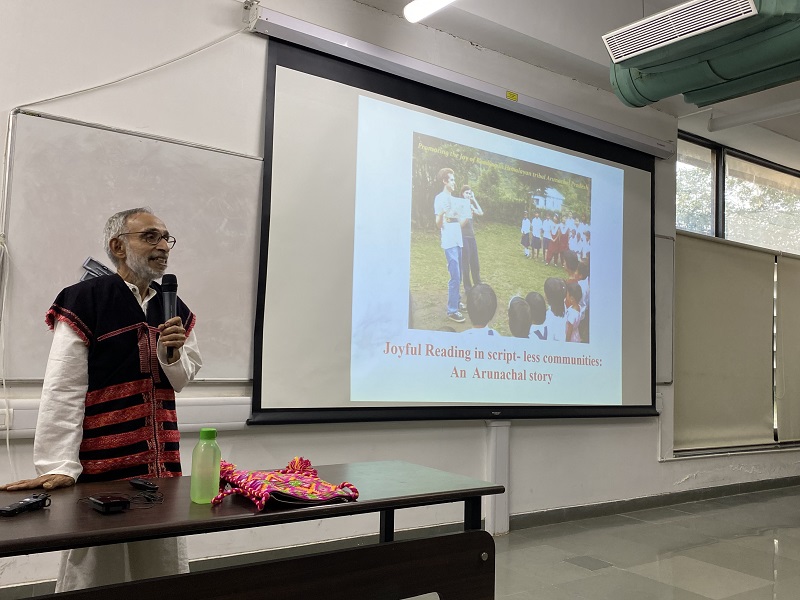STORY CREDITS
Writer/Editor: Shivangi Vasudev Bhatt
Photo: Media and Communication, IIT Gandhinagar
The Humanities and Social Sciences (HSS) discipline of the Indian Institute of Technology Gandhinagar (IITGN), as a part of its Social Justice Seminar Series, organised a talk titled “Joyful Reading in Script-less Communities: An Arunachal Pradesh Story”, by Padma Shri awardee educationist and social reformist Shri Sathyanarayanan Mundayoor, on September 06, 2022.
In his talk, Shri Mundayoor, also fondly known as Uncle Moosa, shared his remarkable journey of more than forty years to bring educational reform in North-East India, especially in Arunachal Pradesh, where he also founded the Lohit Youth Library Network in 2007 with the help of local volunteers and administrative officials. He said that the promotion of education is beset with certain challenges that are common to all Indian states, and in such a scenario, the experiences of working in Arunachal Pradesh could provide the avenue to understand and improve upon the models for education delivery and promotion.
Providing a story-like overview of the changes in the education sector in Arunachal Pradesh from 1947 to the present, where most of the local communities speak various languages that don’t have a script, Shri Mundayoor emphasised that the gaps in the formal system made him realise that he needed to work outside the system to promote reading.
We launched Book Reading Campaigns (1998-2022) jointly with district administration, libraries, teachers, and volunteers to reach out to the reading deprived in the remote border villages like Kaho, Walong, Chaglagam, Hawai/Lohit, and Anini (Dibang Valley). Our sole objective is that if the reader does not come to the books, then the books must go to the reader.
Shri Sathyanarayanan MundayoorBrimming with energy and inspiration, Shri Mundayoor emphasised how his focus has always been on developing a people’s model- an entity owned and run by people. He shared his belief in the maxim that “each one can teach many”. During vacations, the volunteers and students are encouraged to take the books from libraries to their native villages and promote reading in their native places. With his Library Network, he has primarily sought to mobilise students and young people to take the initiative for change. He talked about how, in his vision, the library has functioned as an ‘Action Centre’, wherein a host of participatory activities are organised to make reading an attractive exercise.
He talked about how the Lohit Youth Library Network has also been instrumental in cultivating the spirit of social responsibility and confidence and making people realise that “everyone can contribute for the less privileged in whatever ways they can.” He reiterated, “Social transformation cannot take place unless people come together and participate in it”, and summed up the success of the Library Network as a confidence movement that has grown with baby steps.
The engaging talk was an interactive session, and given the range and depth of Shri Mundayoor’s experience, the audience was keenly interested in learning more about his life, the challenges he faced, volunteering options with the Library Network, and the ways to tackle the uncertainties of working in an unknown field. On being questioned about the challenges he faced as a non-native when working in Arunachal Pradesh, he shared that every community has its own way of looking at things and every challenge also offers a new opportunity. He talked about how he had been unequivocal in his approach that spoon-feeding was not the way to bring about a change. Roping in people is essential, which is why he involved volunteers in his project.
Encapsulating the essence of his journey, he emphasised the need to sensitise people. He concluded by saying, “Reform does not happen overnight. It takes time. The right people just come. However, that does not mean the end of challenges. Challenges remain.”
About Shri Sathyanarayanan Mundayoor:
Born in Kerala, Shri Mundayoor has been working in Arunachal Pradesh since 1979. He left his job as a Revenue Officer in Mumbai and went to Lohit in Arunachal Pradesh. Keen to build up reading habits among children, he has made several efforts to reach tribal families in the hilly state. He also founded the Lohit Youth Library Network, a voluntary movement, in 2007, which now has a network of 13 unit libraries in places like Wakro, Namsai, Roing, Lathaw, and Anjaw. In recognition of his extraordinary efforts in promoting a joyful education in Arunachal Pradesh, he was awarded Padma Shri in 2020.
This news has been covered by some of the leading Indian newspapers and media agencies. Click on the links below to read more.

